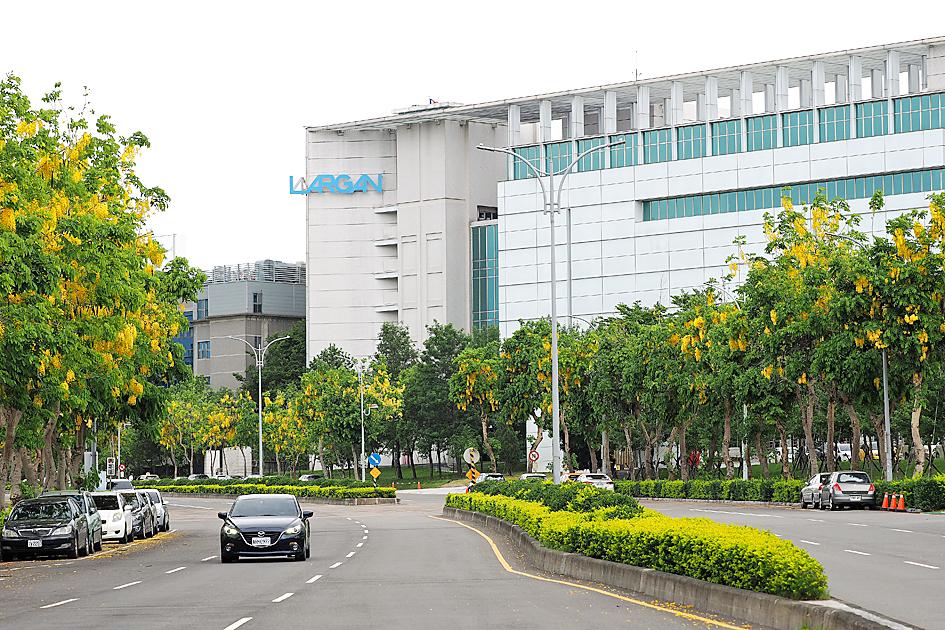Largan Precision Co (大立光), a major camera lens supplier to Apple Inc’s iPhones, yesterday said that it expects revenue to dip further next month, dampened by semiconductor supply constraints and fewer working days due to the Lunar New Year holiday.
As order visibility remains low, Largan cannot provide a clear business outlook for March and this quarter, Largan chief executive Adam Lin (林恩平) told an investors’ teleconference.
“It appears that January [revenue] will be weaker than December. February will be even lower due to the Lunar New Year holiday,” Lin said.

Photo: David Chang, EPA-EFE
It is still premature to predict when revenue would return to monthly growth, he said.
“The scarcity of semiconductors remains severe and that spells some problems,” Lin said. “We do not have a clear picture for March.”
Largan attributed the shortage of some semiconductors to lower revenue last month, missing the company’s estimate of no change from November last year.
However, customers remain active in designing new camera lenses for premium smartphones this quarter, the Taichung-based firm said.
It has received as many projects this quarter as in the same period last year, Lin said.
It is uncertain whether those projects would ultimately contribute to revenue, he said.
In the third quarter last year, one of Largan’s customers scrapped its orders for high-end, high-margin camera lenses, dealing a blow to its gross margin last quarter.
Huawei Technologies Co (華為) was widely believed to be the customer after the US imposed a ban on some exports to the Chinese company.
The order loss drove gross margin down to 64.43 percent from 65.65 percent in the previous quarter, the weakest in seven quarters.
Gross margin for all of last year dipped to 66.98 percent, the firm’s lowest since 2015.
Twenty-megapixel lenses accounted for 10 to 20 percent of its overall shipments last quarter, down from 20 to 30 percent in the third quarter last year, the company said.
To fill the capacity void, Largan does not rule out the possibility of producing mid-range lenses for customers at good prices, Lin said.
The company would supply voice coil motors (VCM) on request, as it has been making them for the past five or six years, he said.
The company is reportedly to start supplying VCMs for new iPhones this year.
Net profit tumbled 19.41 percent to NT$6.52 billion (US$229.34 million) last quarter, compared with NT$8.09 billion in the same quarter of 2019, but rose 18.4 percent from NT$5.87 billion in the third quarter last year.
Earnings per share (EPS) dipped to NT$51.83 last quarter from NT$60.32 a year earlier, an increase from NT$43.74 in the prior quarter.
Largan’s net profit last year was NT$24.53 billion, contracting 13 percent from NT$28.26 billion in 2018. EPS fell to NT$182.86 from NT$210.7.
Separately, Largan said that a new plant would become operational in 2023 as scheduled.

NEW IDENTITY: Known for its software, India has expanded into hardware, with its semiconductor industry growing from US$38bn in 2023 to US$45bn to US$50bn India on Saturday inaugurated its first semiconductor assembly and test facility, a milestone in the government’s push to reduce dependence on foreign chipmakers and stake a claim in a sector dominated by China. Indian Prime Minister Narendra Modi opened US firm Micron Technology Inc’s semiconductor assembly, test and packaging unit in his home state of Gujarat, hailing the “dawn of a new era” for India’s technology ambitions. “When young Indians look back in the future, they will see this decade as the turning point in our tech future,” Modi told the event, which was broadcast on his YouTube channel. The plant would convert

‘SEISMIC SHIFT’: The researcher forecast there would be about 1.1 billion mobile shipments this year, down from 1.26 billion the prior year and erasing years of gains The global smartphone market is expected to contract 12.9 percent this year due to the unprecedented memorychip shortage, marking “a crisis like no other,” researcher International Data Corp (IDC) said. The new forecast, a dramatic revision down from earlier estimates, gives the latest accounting of the ongoing memory crunch that is affecting every corner of the electronics industry. The demand for advanced memory to power artificial intelligence (AI) tasks has drained global supply until well into next year and jeopardizes the business model of many smartphone makers. IDC forecast about 1.1 billion mobile shipments this year, down from 1.26 billion the prior

People stand in a Pokemon store in Tokyo on Thursday. One of the world highest-grossing franchises is celebrated its 30th anniversary yesterday.

Zimbabwe’s ban on raw lithium exports is forcing Chinese miners to rethink their strategy, speeding up plans to process the metal locally instead of shipping it to China’s vast rechargeable battery industry. The country is Africa’s largest lithium producer and has one of the world’s largest reserves, according to the US Geological Survey (USGS). Zimbabwe already banned the export of lithium ore in 2022 and last year announced it would halt exports of lithium concentrates from January next year. However, on Wednesday it imposed the ban with immediate effect, leaving unclear what the lithium mining sector would do in the